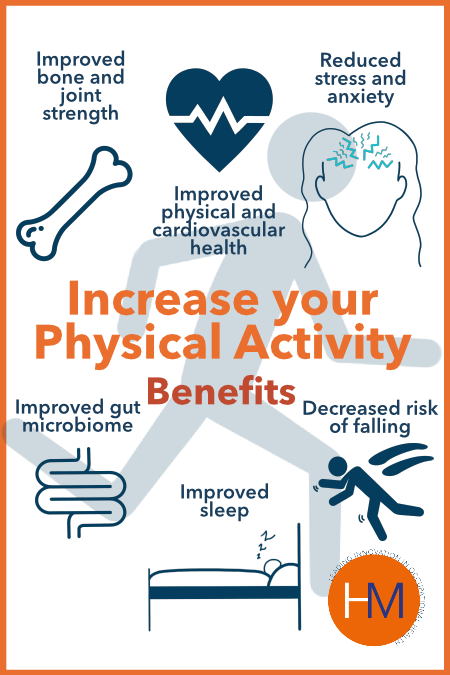
Improved physical and cardiovascular health
Regular physical activity can improve the amount of activity your body and heart can tolerate, meaning it won’t always feel so hard. The lungs will be able to take in more oxygen and your body will become more efficient in transporting that oxygen around the body resulting in less fatigue.
Consistent exercise can also lead to a decrease in blood pressure and bad cholesterol, increase in good cholesterol and an increase to insulin sensitivity.
All of these factors work to lower your risk of health problems such as coronary heart disease, hypertension and osteoporosis.
Improved bone and joint strength
As we get older we lose bone density, making them brittle and more prone to breakages. Keeping up with your physical activity and using weighted or resisted exercises can slow the loss of bone density. Weight bearing activities such as brisk walking, running, jumping and strength training produce a force on the bones that promotes bone growth and bone strength.
Physical activity can also help with arthritis and other rheumatic conditions affecting the joints by keeping them moving, plus, muscle strengthening exercise can aid with pain management.
Reduced stress and anxiety
It is well-known that physical activity releases endorphins, a powerful chemical in your brain that energises you and makes you feel good, what is lesser known is that is can also promote several changes in the brain including neural growth, reduced inflammation and new activity patterns which can all help feelings of calm and wellbeing.
Studies have shown that regular exercises can not only help with mild-moderate depression but it can also help prevent relapse. Exercise can also aid anxiety by relieving tension, boosting physical and mental energy and releasing those endorphins.
Improved gut microbiome
Research suggests that regular physical activity can have a number of positive effects on gut microbiome including an increase in the number of beneficial microbial species meaning a more diverse and healthier gut.
Decreased risk of falling
Keeping active as you get older helps to maintain your balance and stabilising muscle strength decreasing the risk of falls and the injuries that can occur from them. Or, if you have fallen, maintaining general muscular strength can help you if you need to get back up.
Improved sleep
Physical activity increases the amount of energy expenditure made throughout your day, this will help you to feel more tired in the evening and result in falling asleep easier, research indicates that regular and consistent exercise can help increase sleep duration, getting you closer to the 7-8 hours of sleep needed every night.
Exercise has also shown to increase the time spent in deep sleep, the sleep phase that physically restores the body to boost immune function, support cardiac health and control stress and anxiety.






One reply on “Benefits of Increasing your Physical Activity”
[…] our ‘Improve your physical activity’ posts for more guidance and benefits of […]